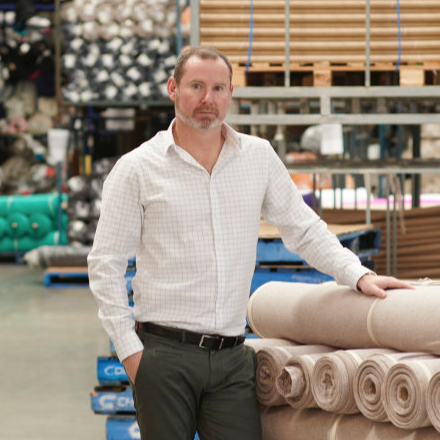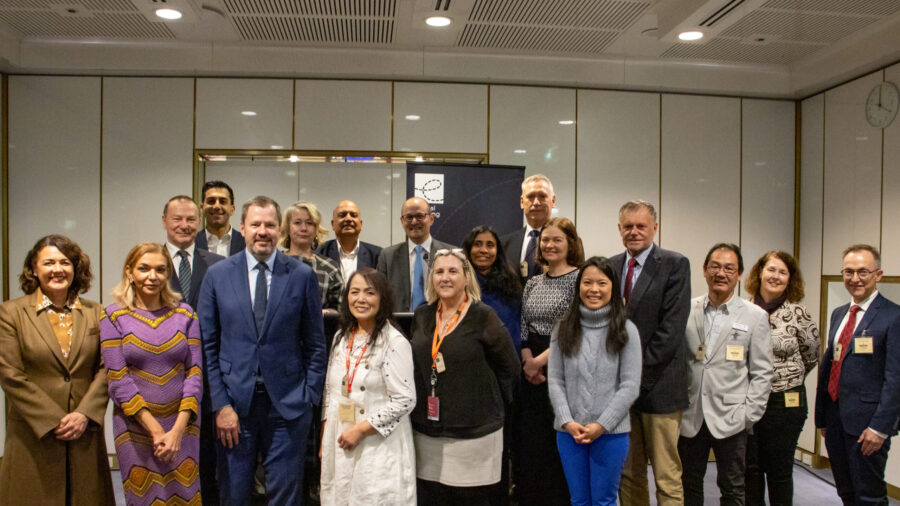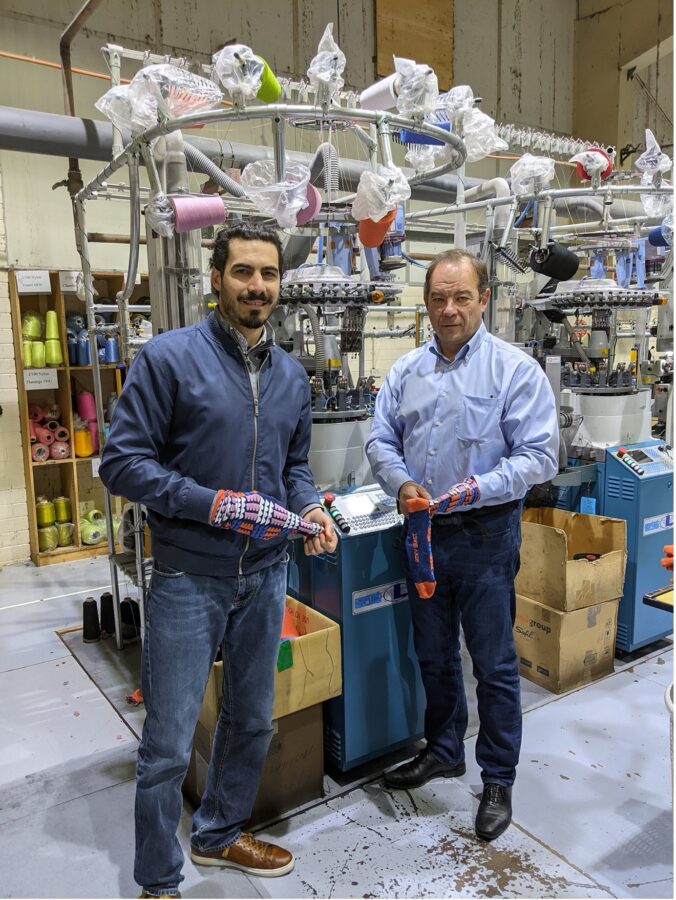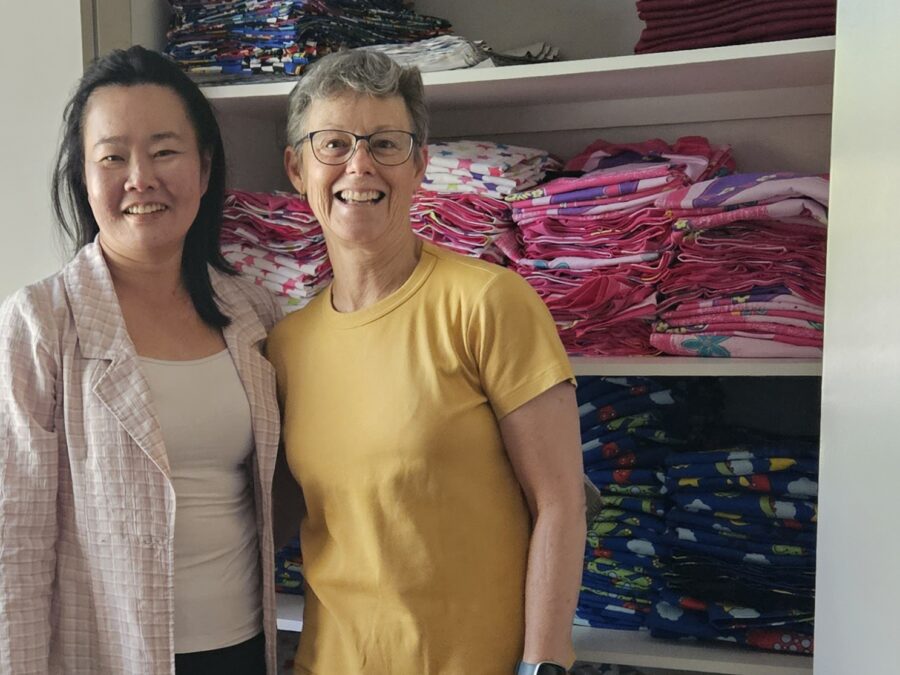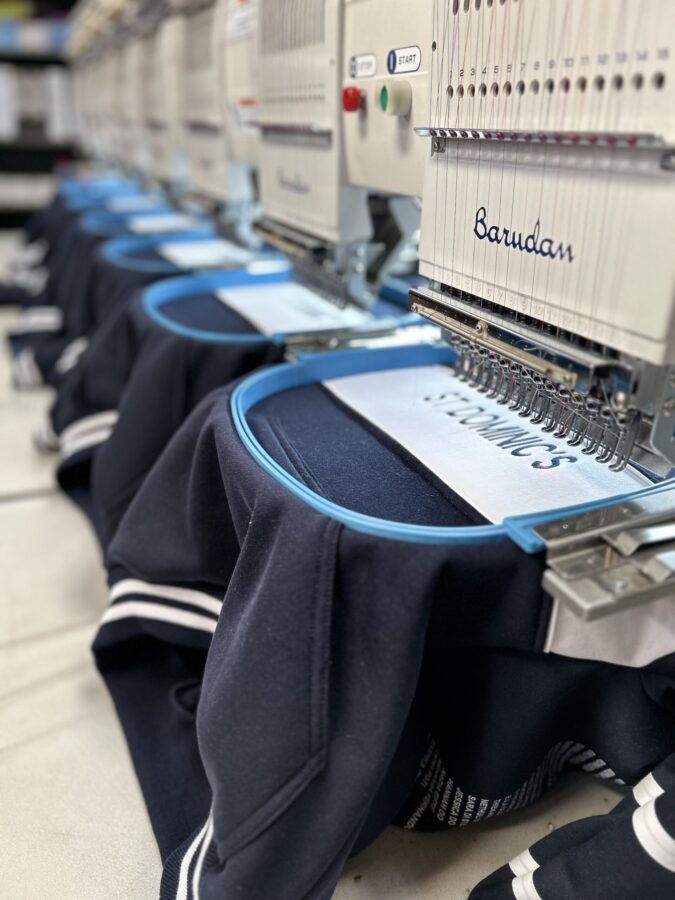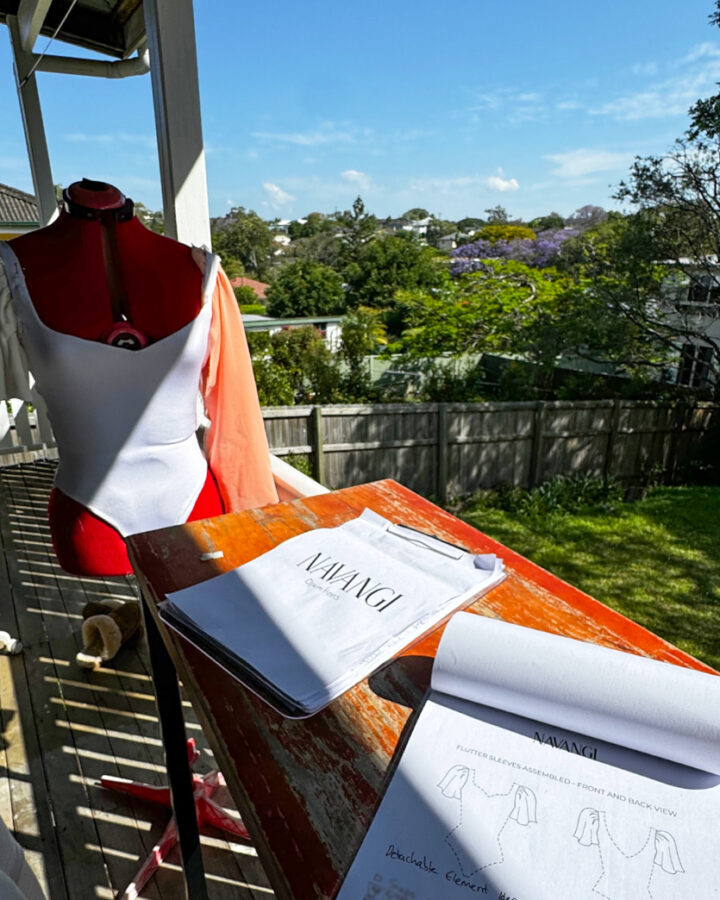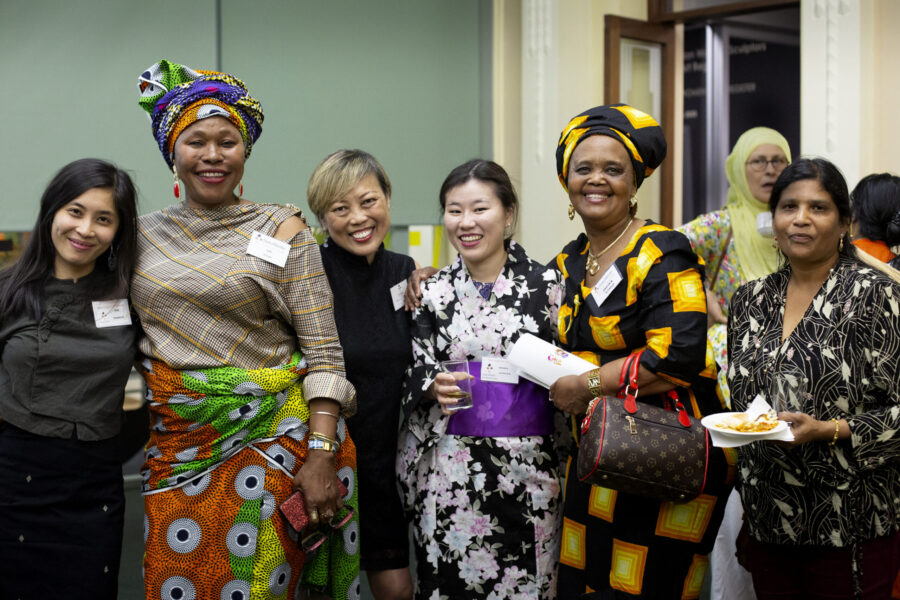Exclusive: A Conversation with Clare Press!
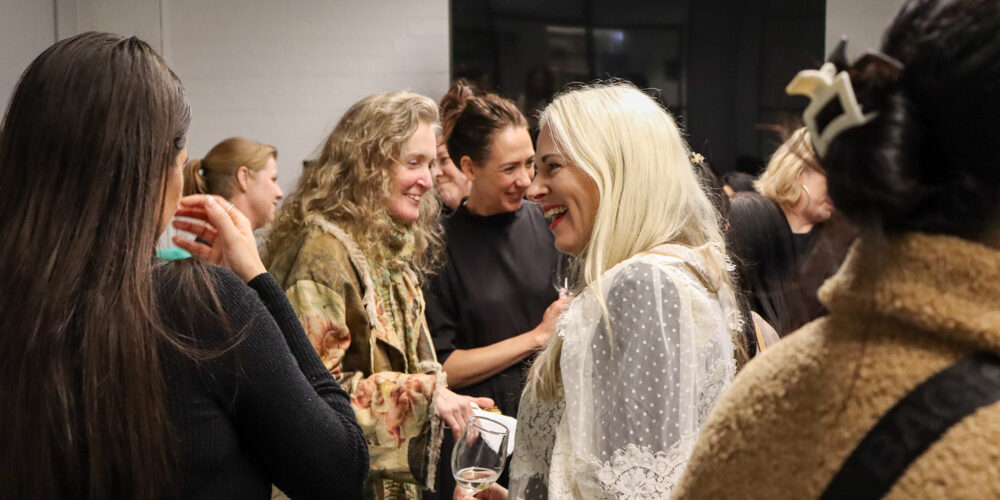
Women's Leadership Network Exclusive
A Conversation With Clare Press!
On Friday 19 April, Ethical Clothing Australia was excited to host our first official event for our Women’s Leadership Network in Victoria, “A Night with Clare Press.”Clare is a renowned sustainability communicator, author, presenter, podcaster and more and she’s become a respected leader in conversations around sustainable and ethical fashion.
Interviewed by her friend and mentee Kirsten Lee, who is the Fashion and Sustainability coordinator at Collarts, we heard a personal and honest conversation about the challenges and joys that women experience as leaders, workers, consumers and humans.
Exclusively accessible for our network, here’s the whole conversation!
On... the statistics around women leaders
Kirsten: For women particularly, we tend to have this notion of being “lucky” or having this good fortune. But it’s hard work and we need to acknowledge that it takes hard work, especially in the world that we live in.So, I wanted to lead with that – have you experienced that notion of “I’m lucky to be here” yourself?
Clare: Yes! I don’t want to think of this as entirely gendered, and yet it is women who tend to diminish their successes, deflect the compliment and make out like it was some sort of happy accident.
It’s ridiculous, isn’t it?
I think everybody knows when we talk about women and leadership, there is still, overwhelmingly, a huge gap [between the sexes when it comes to power in the boardroom], but I wanted to look up the stats:
Okay… Women make up roughly half the workforce, but what does women’s leadership look like in the C-suites in 2024? Just 19% of CEOs are women in Australia, and around a third of key board positions are held by women in Australia.
It’s still such a problem.
And then according to The McKell Institute, micro businesses make up 89% of Australian businesses. That’s the backbone of our economy!
Yet there remains this perception that when we talk about ‘micro business’ we mean tradies; that this enormous part of the economy is mostly male run. But it’s not the case! Women are running micro/ small businesses, and they are growing at a faster rate.
On... women and sustainability
Clare: The other thing I wanted to say was about sustainability: if you walk into a sustainability conference, whether in Australia or globally, you will find overwhelmingly women.This is something to celebrate, but it’s also a problem. Because of this perception that we’re the nurturers, and therefore the environmental crisis is up to us to solve…
But I do take a lot of inspiration from the fact that there are so many brilliant women, changing the game when it comes to sustainability. Overwhelmingly the people who are leading the new teams in sustainability are women. And that to me says something. I think it’s to do with leadership style. I think it’s to do with sustainability requiring us to be collaborative in ways that top-down, old school management structures just do not allow for. So, there is a female leadership shape that makes this different.
On... bringing others along for the journey and making change
Kirsten: That leads me to my next question! In celebrating and supporting women leaders how can we platform diverse voices and bring others along?Clare: Alright, I’ve got a new book out but instead, I’m actually going to promote Emma Dabiri’s book What White People Can Do Next. What an amazing writer she is!
So, I have my podcast Wardrobe Crisis (which is free, by the way!). I’ve been doing it for seven years, and I get to interview a lot of extremely brilliant people who tell me stuff I didn’t know. In my view, it’s the greatest job of all time! Anyway, we just did this mini-series about diversity, inclusion and belonging. One of the guests was Caryn Franklin. Has anyone heard of her? She was The Clothes Show presenter in the UK in the 80s and 90s, so thanks to Caryn, when I was a kid in growing up in Britain, we had fashion on prime-time telly, Sunday nights at 5pm. It was very fab, and we were all obsessed with Caryn Franklin! I was so excited that I got to speak with her for Wardrobe Crisis.
These days, she is a Professor of Diverse Selfhood and Fashion Psychology at Kingston University – she’s like this cultural national treasure.
Her personal story, which she relates on my podcast, is very moving. In her 20s, She fell in love with this filmmaker, who just happened to be a black guy. She explains that, at the time, she didn’t see that as particularly significant in terms of their relationship, but later she realised that he did, or he must have. In her 20s, she simply didn’t see the world in that way. Anyway, he died, he had rapid onset multiple sclerosis. They were very young, and parents – she’d just become a new mum. 25 years later, she told me, understanding race, selfhood, diversity and inclusion has become a major part of her life’s work. And in this podcast, we talk about what we can all do to make a more genuinely fair, equal diverse and inclusive society red, and I said to her: “How do we be good allies?”
And she said, “Actually, that’s not the language I would use. There are problems with this idea of allyship – it can be condescending, but also, it’s not really about system change; it stops short.”
And I said, “Really? I thought allyship was part of the work that I, as a white woman, ought to be doing.”
And she recommended Emma Dabiri’s book, which I just got out of the library. I would encourage you to read it too, if you haven’t heard of her. She’s an Irish writer. And I’m going to read out to you, from a chapter called ‘Interrogate Whiteness’.
She’s talking about the need to catalyse systemic change, and to question the systems that deliver us inequity, rather than making them slightly more palatable, and keeping the system as it is, right?
She says: “Rather than engage with any of this, the liberal mainstreaming of the discourse distracts us, distracts us with trivia, like ‘diversify your feed’ – not a problem, per say, but woefully inadequate if it’s your major contribution to anti-racism.”
This is the kind of stuff that we do in our businesses, right? To box tick. We stop at the performative social media things.
So anyway, Kirsten, my answer to your question is this: we’ve got to go deep if we want to change the systems that are giving us outcomes that are not fair.
It can’t just be that we post on social media and then we pat ourselves on the back. The current default, I worry, is stop at talking about how we care.You've got to be radical in your thinking! You've got to really challenge yourself to do the work, rather than just seem like you care.
— Clare Press
Emma’s book focuses on racism, but we can apply this thinking to climate action or workers’ rights or ‘insert here’ – any of the systemic, thorny, enormous justice problems we’re wrestling with.
So, that was a long way of saying: you’ve got to be radical in your thinking! You’ve got to really challenge yourself to do the work, rather than just seem like you care. Or say you’re going to do it.
We need to take practical steps, and we can begin to do that by boldly questioning when we see things that aren’t right.
For example, panel discussions and workshops always have the same people running them and it can be tempting to say, “Please let it still be me, I’m available!”
But if you want to change things say, “No thank you. May I recommend this person instead?” And lift someone else up.
And that that doesn’t have to be about race, that could be about age, that could be about experience. Often, we’re also not allowing the next generation of potentially brilliant but maybe less experienced people to gain the experience that they need because we will not get out of the way.
Kirsten: It’s also important for us to look around if we’re able to hire or to make hiring decisions to use that as an opportunity to hire people outside of the hiring bias, where you hire people like yourself.
Clare: If we want to make progress, we’re going to need to have a lot of different opinions and different perspectives from a lot of different people, aren’t we? So, one small example from my own work is when I get invited to come and talk at things, I often say, “Who else have you got?” And then they’ll tell me, and I’ll go, “Oh, they’re all the same as me though!” And they say, “Well, they’re all good at sustainability!” Not good enough. That’s my opportunity to challenge things. To ask: What diversity in perspective have we got here? What voices are missing here?
On... overwhelm and isolation
Kirsten: Tonight, we’re meeting people – potentially for the first time – and creating community. I think in your book, Wear Next, you talk a little bit about the importance of community and that support. And that feeling of feeling alone – trying to create change as a single person, versus being part of a community that is collectively challenging the system. Could you talk to us a bit more about that?Clare: The platitude is that you can’t change the world on your own. And everybody knows that, but in fact by virtue of – I’m going to say just practicalities – we often find ourselves in the position where we’re doing exactly that or trying.
When the people around us are not as focused on, for example, sustainable supply chains as we are, it can just make you feel like you’re the only one who cares. Then we come to the overwhelm.
If you work for yourself, you’ve got so many responsibilities. I’ve done it!
I had a small fashion business so I know what it’s like: you must keep the doors open; you’ve got to keep the bills paid. You’re the designer; you’re the one who has to get the stuff made; you’re the one selling it. You’ve got to manage everything. It is so much. And then add on that a layer of the values-based desire to change the system! And guilt at producing anything at all in this world of over production and crazy fashion waste!The secret is other people.
— Clare Press
If you lay on all these stresses on top of each other, you just get stuck, right?
There were times when I would literally cry on the floor when everyone had left for the day, and that was before I even factored in sustainability. I had no idea about sustainability back then.
I ran a vintage-inspired womenswear label – I used to fix up vintage things and I made = very small runs of new collections. I also had a retail store on Oxford St, Sydney, and sitting in that shop after hours panicking about not having enough sales, not being able to pay the rent, I can remember it very clearly.
Overwhelm is a huge problem. Absolutely huge.
I think this is the secret…not just to how we tackle the big things – which is what we’re thinking about, about climate anxiety or waste anxiety or wanting to make a difference around human rights – but just that stuff around not ending up crying on the floor!
The secret is other people.
It absolutely is! And I would encourage you, if you work for yourself, to build into your diary time to network – even though that seems like it’s not important because money seems like the most important thing!
Because if you don’t do that, you’re not truly sustainable, sustainable as in ‘being able to continue’. The word sustainability applies to you too, right?
Kirsten: Absolutely. When I first heard of Clare, it was when she was writing about sustainability at, I think Marie Claire, but it might have been Vogue. I was 15 and I used to cut out all the articles because suddenly the magazine had all this social justice and animal rights content that I hadn’t seen before. I was like “What a boss!”
I think that honestly planted a seed in me and I think that’s what we can do for each other. We have no idea what impact we’re having on the people around us, just being yourself and being a boss.
And you’ve planted a lot of these seeds! Even through me, because then I’ve gone out and taught students!
Clare: The number of students that come up to me and say, “Ah Kirsten was my teacher!” Because you’re supporting their dreams!
I think there is something in what you just said about not knowing who you’ve impacted. A little thing may have been enough. And that comes from things like this or even comments you have online, some small conversation you have on Instagram can change people’s day. People really do sometimes need you to say to them: “I loved that; it was beautiful.” Or “I’ve been there. And I understand.” That can really change things.
On... community and imagining the future of fashion
Clare: In this new book, Wear Next, I imagine 16 scenarios of a better fashion future. I didn’t make them up – I canvassed scores of different people’s opinions – from the worlds of fashion, academia, workers’ rights, science, design, futurism – about what is likely to happen. I set myself a challenge, something we call a ‘thought experiment’. In this case: What if we imagined a fashion future that’s actually better than it is now?You know, most of the time we imagine it will be worse. If you watch the news, I’m sure you can relate that sometimes you think we are in real trouble. If you go into a research rabbit hole, you can really start to panic.
We are obviously dealing with difficult times, but what if we did make a positive change? What if we got it right?
Each chapter begins with one page and the word: Imagine. I imagine, what it could be like around this theme if we got our acts together. I’m going to read to you from the page on community.
It is either ridiculous, or maybe it’s possible, it’s already happening, and we could do it. I think that’s your choice. Personally, I like the glass half full.
“Community. Imagine.
Shareholder capitalism is so last century. We expect businesses of all sizes to act in the best interests of the environment and communities. Materialism has been tempered and there is a general consensus that relationships are more important than things.
“That’s not to say we don’t shop anymore – but most of us are looking to make a positive difference through our purchases. In the fashion space, that’s often delivered via social purpose. We seek out social enterprises. All the leading brands have charity partners, and many donate a percentage of their profits to social causes. The most successful build communities around their values and act as facilitators for gatherings, educational events and cause-based activations, often in spaces previously deemed ‘too political’. Corporations with a clear purpose attract the best talent, but they have to be authentic. We’re savvy these days about who is walking the talk. Businesses must truly stand for something. There’s obviously more to life than money. Anyway, you don’t need money to access The Commons. We share our skills and knowledge and work towards the collective good. We are the ‘we’ generation.”
That one’s perfectly possible, I think!
Some scenarios are perhaps more of a stretch. But imagine if businesses gave a percentage of their profits to charity. Imagine if everybody said, “I’m not working for that company because they’re not values driven, because they don’t have a clear social responsibility manifesto.”
We could do this stuff!
These pages come from the people I’ve interviewed because if you look in the right places, some of them have all started already.
I think the future of sustainability must involve community.
On... visualising and building a better system
Kirsten: I don’t know if anyone’s seen The Story of Stuff on YouTube?It’s made in the 1990s, based on ten years of research. It basically talks about the fact that in the 1950s when they were trying to ramp up the economy, it was designed so that we would want to consume more and more. And that idea of planned obsolescence and perceived obsolescence was built into our system. And there’s a quote from Victor Labow who was a designer at the time, and he said that we need things burned up at a more and more accelerating rate and, “We need to seek our spiritual satisfaction in consumption.”
Clare: There you go! I always knew we designed it! It didn’t just happen by accident!
Someone decided that the toaster should only last six months and then you should buy another one.
But don’t be sad, because that to me is a very powerful thing to understand. Because if we designed this rubbishy system, now we can design another one, a better one!
Kirsten: There’s this exercise at yoga that our beautiful teacher gets us to do called a jump back. I don’t know if anyone knows yoga, but you are supposed to jump back into plank. And everybody just falls flat on their faces the first time. And our teacher would say, “Let’s just try and imagine it and visualise it.”
So, then you close your eyes and sit there and imagine jumping back and she talks you through it happening successfully and then she’d say, “Let’s try it again” and nearly everyone nails it.
That’s what you’ve done with this book, Clare.
It’s not impossible. We just must find our way back there from where we are now. It’s about how we do that, and I think that’s a conversation that everybody needs to be involved in and that’s why it is important.
Clare: It’s very well documented that the antidote to overwhelm is action. Like, if you feel terrible about plastic pollution, I promise you’ll feel less terrible if you start to reduce plastic in your kitchen. It seems like you won’t, but you will. Just the action breeds momentum.
For anyone feeling overwhelmed and like you can’t change things, just the powerful act of imagining a different future allows your brain to start figuring out ways to do it. When you visualize something happening in steps you get there.
On... changing culture and planning for the future
Clare: You change culture by the small, imperfect steps.So, think about Ethical Clothing Australia. You may think, well, that’s a serious accreditation that’s about worker rights and unions and that’s got nothing to do with changing cultures. But it does. Because imagine if we normalised the expectation that all workers were treated with dignity and all workers understood their rights and all businesses recognised that it was their responsibility to ensure that all of these things were upheld. It’s not normalised, so people don’t think about it. But if that was the norm, not the exception, you would have a different dynamic.
I think what I’m trying to say is, our individual actions might seem small but cumulatively, they are culture shifting.
We are in a position now where we’re living in a very old system, and it’s not really fit for purpose. And business is at the centre of this, businesses that we work in and create. We are in an era where this is all starting to wobble and be reformed. Think fashion is just clothes? No! Fashion is right in the middle of all this stuff.Imagine if we normalised the expectation that all workers were treated with dignity and all workers understood their rights and all businesses recognised that it was their responsibility to ensure that all of these things were upheld.
— Clare Press
If you run a business in 2024, in 2030 it’s not going to be the same conditions. We’re in a state of change. So then what sort of business do you want to make? You want to make one that is successful in the future? That’s going to have to be looking at a different shape, a different success metric – one where we really prioritise a culture of well-being and when we make that culture of being very inclusive.
On... a final word
Kirsten: Can we have a one-line answer? For people who feel alone, what would your one sentence answer be to find community in this space?Clare: It sounds like homework, but I would literally diarise networking. And choose a way you find fun – and this is fun! Before you leave tonight you could talk to someone you haven’t talked to and introduce yourself and then follow it up.
But in one sentence: make an effort. Make it that one thing you are going to do rather than putting it in the “nice but I haven’t got time” basket. Because it feels lovely, and it changes everything.
Related articles
Explore more insights, updates and stories from across Australia’s ethical and local manufacturing industry.

